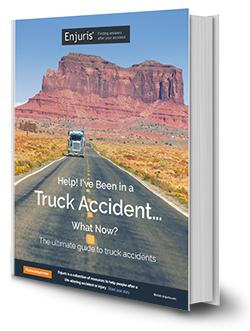Find legal support after a serious truck accident.
A truck accident is more complicated than your typical car accident, and it more often leads to severe injuries
On August 30, 2021, life changed forever for University of Florida football player Yousef Mugharbil. Just 18-years-old at the time, Yousef was dragged about 100 feet by a semi-truck on University Avenue in Gainesville after being hit. Yousef was riding a scooter in an undesignated driving lane and became trapped between the tires of the truck.
The truck had the right of way when it was making a turn, and Yousef drove his scooter in a lane that was striped off, so the lane directed the scooter directly into the path of the turning truck. Fortunately, Yousef is expected to recover from his injuries. (source)
Earlier that month, Marie Hines of Gainesville was sitting inside her home on Northeast Waldo Road when a truck crashed into her house. The truck had been driving down Northeast Waldo when a car approaching from Northeast 53rd Avenue collided with it, sending the truck flying into the house. Fortunately, Marie and the 2 occupants of the truck were uninjured. The occupants of the car required medical treatment. (source)
On that same day, a crash involving 3 semis and 2 cars tied up I-75. Two people were transported to area hospitals.
Tragically, another multiple-fatality accident happened on I-75 in January 2019. There were 12 passengers in a van struck by a tractor-trailer that crashed through a guardrail. Although everyone in the van, on its way to Disney World, was wearing their seatbelt, 7 were killed — including 5 children and the drivers of 2 tractor-trailers. There were 5 vehicles involved in the crash, with a total of 16 occupants. Only 1 occupant, the driver of a pickup truck, was not injured. (source)
Technically, no. Gainesville is not any more or less dangerous for truck accidents than other cities of its size. However, the area did see a spike in heavy truck crashes between 2011 and 2015, mainly on I-75 in Alachua, Marion and Sumter counties.
Regarding the lethality of truck accidents, the Insurance Institute for Highway Safety (IIHS) says that:
"The main problem is the vulnerability of people traveling in smaller vehicles. Trucks often weigh 20-30 times as much as passenger cars and are taller, with greater ground clearance, which can result in smaller vehicles underriding trucks in crashes.
(source)
The Florida DOT created an I-75 Relief Task Force in 2015 in order to find ways to reduce the incidences of traffic accidents on this busy interstate that cuts right through Gainesville. Its report outlines ways that the highway can be made safer over the next several decades.
Some of the task force's recommendations include:
- Facilitating intercity bus and rail services in order to ease road congestion from projected growth in population, jobs, and visitors.
- Developing logistics centers for multiple shippers and carriers in order to reduce the number of empty trucks and using information technology for load matching.
- Better parking and staging areas to support trucking on I-75 and U.S. 301.
- Expanding capacity and improving safety, efficiency, and reliability by using express lanes and truck-only lanes on I-75, U.S. 41 (from Hernando to Columbia counties) and U.S. 301 (from Hernando to Duval counties).
Whether you or a loved one are injured in a truck accident on a major highway like I-75 or a rural road, the days, weeks and months that follow are bound to be full of extreme physical, emotional and financial challenges.
Fortunately, you don't have to face these challenges alone.
When do you need a Gainesville truck accident lawyer?
When you're in a car accident that involves just 2 vehicles, you can often settle it directly with your insurance company and you might not need an attorney if the damages aren't severe or costly.
But a truck accident usually needs to be handled differently.
Here are 4 reasons why:
- A truck accident often results in much more severe injuries than a car accident. If you drive an average-sized car, it probably weighs around 4,000 pounds. A "big rig" tractor-trailer, 18-wheeler or semi-truck might weigh more than 30,000 pounds if fully loaded. In addition to the weight difference, the center of gravity for a large truck is much higher than a passenger car, which means the truck and its driver are likely to fare much better in a crash than the car occupants. It also means that the force involved in an accident between a truck and a car is likely to leave a car occupant severely injured.
- You might not know who is at fault. In an accident involving 2 cars, it's likely that 1 driver caused the accident. Sometimes, it doesn't matter because Florida is a no-fault state, which means an injured person turns to their own insurance company for coverage of medical treatment and other costs after an accident, regardless of who was at fault.However, if the accident leaves you with severe injuries that will require treatment that costs more than your insurance covers, you would need to pursue a lawsuit in order to have your expenses covered in full. In that situation, the victim (injured person) would sue the at-fault party. In a car accident, that could be the other driver. In a truck accident, it could be much more complicated.Depending on how the accident happened, various parties could hold some degree of liability — including the truck driver, trucking company, shipping company (because it could be who loaded the cargo), driver's employment company, manufacturer of the truck or some of its parts, or even someone else. Your lawyer will need to obtain a variety of records and documents, in addition to accident reports and other evidence, in order to determine who is the correct defendant (or there could be several defendants) for a truck accident.
- You'll need help working with the trucking company's insurer. A trucking company has deep pockets — and a team of insurance adjusters whose job is to spend the least amount of money possible to settle a claim and make it "disappear." The adjuster handling your claim probably has a pile of other claims just like yours, and to them you are just another claim number. They could make you an offer that sounds appealing, but it might not be enough.Your attorney is the best person to evaluate how much you actually need in damages, if you require future treatment or there are other expenses that might not be immediately obvious. Before you agree to any settlement, you should consult a Gainesville truck accident lawyer.
- You could be entitled to a large amount of damages. "Damages" are the costs a plaintiff can recover in a lawsuit. Damages should cover all expenses related to an accident. When you've been injured, a personal injury lawsuit is designed to make you financially "whole" again. In other words, you should be restored to the same financial condition you'd be in if the accident hadn't happened.
Common truck accident damages include:
- Medical expenses, including doctor and hospital visits, surgeries, outpatient procedures, prescription medications, etc.
- Costs for adaptive devices
- Ongoing treatment like physical or occupational therapy
- Lost wages (past and future)
- Costs for property damage (like repair or replacement of your vehicle)
- Compensation for assistance with daily activities (like child care, personal aide, etc.)
- Pain and suffering, for PTSD and other emotional distress caused by the crash
- Funeral and burial expenses, if the crash resulted in the death of your loved one
A truck accident lawyer has access to financial professionals and other experts who can make an accurate assessment of your damages and negotiate with the insurance company or the trucking company's lawyers to get you the best possible settlement.
Florida pure comparative negligence system
Each state follows 1 of 4 fault systems, which determine whether (and how much) a plaintiff can recover for an injury if they share any liability.
Florida follows the pure comparative negligence rule, which means that a victim may recover damages that are reduced by their portion of fault. In other words, if the truck driver caused the accident but you were 20% at fault, your damages would be reduced by 20%.
If you are found to be more than 50% at fault for the accident, then you are unable to recover any compensation.
Causes of Gainesville truck accidents
Truck accidents could be caused by a truck driver, car driver, or other factors like road hazards and poor weather.
When a truck driver causes an accident, it's often because of:
- Inadequate training on driving techniques, safety, and defensive driving.
- Fatigue or exhaustion from hectic schedules of trucking companies, with too many hours on the road and pressure to move quickly from one location to another. Some trucking companies encourage speeding and fewer hours of sleep by paying more to drivers who are able to travel more miles and make more deliveries.
- Drug or alcohol abuse plays a role in some truck accidents, as drivers may be more inclined to take stimulants like cocaine or Adderall in order to stay awake and meet deadlines.
- Reckless driving encompasses a wide range of aggressive and dangerous driving behaviors that all drivers—including truck drivers—can fall victim to. Common examples include unsafe lane changes, speeding and tailgating.
When a passenger car driver causes an accident, these are some of the most common reasons:
- Failing to get a disabled vehicle completely onto the shoulder of the highway
- Driving in the truck driver's blind spots (areas behind or next to a commercial truck)
- Driving in between 2 or more large trucks
- Fast maneuvers like abruptly changing lanes in front of a truck
- Moving into traffic from the shoulder or merging from an on-ramp without sufficient acceleration in front of a truck
- Moving to the right of a truck that's making a right turn
- Passing too close to a truck and being blown to the side by air turbulence or crosswind
- Making a left turn in front of a truck while misjudging its speed
- Failing to slow down or speed up when a truck begins to change lanes or merge
Truck accident liability
"Liability" is based on the premise that each person has a certain set of responsibilities and obligations in any situation.
As the driver of a car or truck, you are liable for ensuring that your driving is reasonably safe, according to the laws and road rules wherever you are. It also means you have a duty to every other driver and pedestrian to exercise reasonable care for their safety.
There are 2 types of truck accidents that don't always conform to typical liability laws:
- Jackknifing. If the road was slippery or if a driver was forced to turn abruptly to avoid another car, stalled truck or something else, and the truck jackknifed, the driver likely won't necessarily be held liable for the accident.
- Turning accidents. A commercial truck often requires 2 lanes to make a successful right turn. However, if an accident happens, it's possible that the driver can be found liable when turning from an inside lane or occupying two lanes.
What to do after a truck accident in Gainesville, FL (6 steps)
Your first priority is to evaluate your own and your passengers' conditions. If you can do so safely and without pain, you should also check on the physical condition of anyone else involved in the crash. Call for help immediately if necessary.
If you need to call an ambulance and do nothing but wait for it to arrive, that's okay.
Even if there's not a medical emergency, there are several steps you can take to preserve your legal claim:
1. Call the police.
In most situations, this is 911. If you're on a highway, the 911 dispatcher will route your call to the local law enforcement agency and emergency responders. Let the dispatcher know approximately how many people are involved in the accident (it could be multiple vehicles) so that it can send as many ambulances as needed.
Even if the accident seems "minor," get a police report anyway. A police report is the best way to have immediate documentation of the accident, and the police will maintain accurate records of all of the involved vehicles.
2. Document the evidence at the scene.
Again, this is something you should only do if you're uninjured and if it's safe to be out of your vehicle and walking around. If you're on a busy highway and the police aren't there yet to direct traffic, you don't want to be wandering around on the road.
Documentation can include photos, contact information for witnesses and everyone involved in the crash, and other notes about road or weather conditions or other factors that might have affected the accident.
It's especially important to take photos if the weather could've played a role in drivers' visibility or the road was slick. Forensic experts can testify about past weather conditions, but a picture can say a thousand words.
Documentation also includes gathering information from other involved parties. Be sure to get as much of the following as possible:
- Any involved driver's name, home address, phone number, and email address
- Any involved driver's insurance company and policy number
- Any involved driver's license number
- The name and contact information for the truck driver's employer and trucking company
- The truck license plate number and other identifying information (along with those of any other involved vehicles)
3. Write down witnesses' contact information.
A witness is anyone who saw or observed the crash in any way. It could be someone in one of the involved vehicles, a bystander, or a person in a nearby vehicle that wasn't involved.
You don't have to take witness statements at the crash scene. That's the police officer's job. But if it's a very active scene with a lot of injuries and damage, there could be a lot of emergency situations that require the police's attention before they get to interviewing witnesses. Well-meaning bystanders who stopped to help could leave once it seems like the emergency response team has things under control. Once they leave the scene, it's very difficult to track them down again and they might have valuable information to share.
If you're able to do so, approach several witnesses and ask for their contact information. A name, phone number, or email address is all you need to stay in touch. You can pass that information to your lawyer when you get one and provide it to the police when they're performing an accident investigation.
4. Seek medical attention.
Even if you don't think you're hurt and you choose not to be taken to the hospital in an ambulance, get a medical evaluation as soon as possible because you might have suffered injuries that don't show immediate symptoms. If you end up requiring medical attention later for an injury related to the crash, it might be hard to demonstrate that it was related to the accident and not some other cause. You also might have an injury like internal bleeding, which could be hard to detect on your own but a doctor will be able to diagnose.
Even if you've been examined by an emergency medical technician at the scene, request a full medical evaluation at a hospital or your doctor's office.
5. Get your vehicle appraised.
In the case of most truck wrecks, the damage to the passenger vehicle is significant—often resulting in the car being totalled. Even if your car appears to have only minor damage, understand that sometimes the damage is internal and not visible to the untrained eye (like the human body). However, you should NOT go straight to your neighborhood body shop and have your car repaired immediately.
The repair estimate needs to be part of your insurance claim. Each insurance company has different requirements for what must be submitted in order to pay for your damages. Some have apps that require you to photograph each external side of the car, while others require you to bring it to a body shop that's on an approved list.
If roadside assistance is included with your insurance or you belong to a travel association that offers towing, have your vehicle transported to a local body shop. But make sure the shop knows not to perform any work until you've cleared it with your insurance company. Even if you're sure the car is safe to drive, take it to a mechanic or body shop for an assessment.
6. Consult an attorney.
Finally, talk to a Gainesville personal injury lawyer. Truck accidents are complicated. They can lead to lengthy litigation, and can result in high-dollar settlement or judgment amounts — so it's important to take it seriously and seek immediate help.
Refer to this list of free printable documents to help organize your needs after a truck accident:
Need a Gainesville attorney?
What does an injury lawyer do?
A personal injury lawyer helps individuals who have sustained injuries in accidents to recover financial compensation. These funds are often needed to pay for medical treatment, make up for lost wages and provide compensation for injuries suffered. Sometimes a case that seems simple at first may become more complicated. In these cases, consider hiring an experienced personal injury lawyer. Read more





